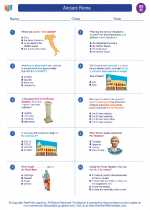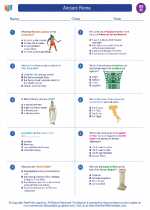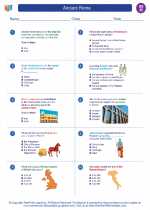Ancient Rome
Ancient Rome was a civilization that emerged around the 8th century BCE on the Italian Peninsula. It grew to become one of the most powerful and influential civilizations in history, with significant contributions to art, architecture, engineering, law, and governance. The civilization lasted for over a thousand years, and its legacy continues to influence modern society in various ways.
Key Aspects of Ancient Rome
- Government and Politics: Rome's government evolved from a monarchy to a republic and then to an empire. The Roman Republic featured a system of checks and balances, with elected officials and a senate. The transition to an empire saw the rise of powerful emperors like Julius Caesar and Augustus.
- Law and Justice: The Romans developed a system of laws that formed the basis of modern legal systems. The concept of "innocent until proven guilty" and the right to a trial by jury were Roman innovations.
- Engineering and Architecture: Romans were known for their advanced engineering feats, such as the construction of roads, aqueducts, and the Colosseum. Their architectural style, characterized by arches and domes, continues to inspire modern buildings.
- Art and Culture: Roman art and culture were influenced by Greek traditions. They excelled in sculpture, painting, and literature. The era of Roman rule also saw the spread of Latin as a common language.
- Religion and Mythology: The Romans worshiped a pantheon of gods and goddesses, with beliefs and rituals deeply ingrained in their society. Many of their myths and legends continue to be a part of popular culture.
- Decline and Legacy: Internal strife, economic challenges, and external invasions led to the eventual fall of the Roman Empire. However, its legacy endured through the spread of Christianity, the influence on law and governance, and the preservation of its architectural and cultural achievements.
Study Guide
To understand Ancient Rome in depth, it's important to focus on the following areas:
- Key Events and Figures: Study the rise and fall of the Roman Republic, the reign of emperors like Augustus and Nero, and significant battles and conquests.
- Government and Law: Explore the structure of the Roman Republic, the role of the senate, and the development of Roman law, including the Twelve Tables.
- Architecture and Engineering: Learn about Roman engineering marvels, such as the construction techniques used in aqueducts and the design of Roman temples and amphitheaters.
- Art and Culture: Understand the influence of Greek art on Roman culture, explore Roman sculpture and mosaics, and examine the impact of Roman literature and language.
- Religion and Mythology: Delve into the Roman pantheon, the role of religion in Roman society, and the myths and stories that shaped their worldview.
- Legacy and Impact: Consider the lasting influence of Roman civilization on modern society, including the spread of Roman law, language, and the adoption of Christianity.
By exploring these aspects of Ancient Rome, you can gain a comprehensive understanding of this influential civilization and its enduring legacy.
[Ancient Rome] Related Worksheets and Study Guides:
.◂Social Studies Worksheets and Study Guides Eighth Grade. Ancient Rome
Study Guide Ancient Rome
Ancient Rome  Worksheet/Answer key
Worksheet/Answer key Ancient Rome
Ancient Rome  Worksheet/Answer key
Worksheet/Answer key Ancient Rome
Ancient Rome  Worksheet/Answer key
Worksheet/Answer key Ancient Rome
Ancient Rome 

 Worksheet/Answer key
Worksheet/Answer key
 Worksheet/Answer key
Worksheet/Answer key
 Worksheet/Answer key
Worksheet/Answer key

Create And Print Roman Numerals worksheets with Roman Numerals Worksheets generator
The resources above cover the following skills:
National Curriculum Standards for Social Studies (NCSS)
TIME, CONTINUITY, AND CHANGE
SOCIAL STUDIES PROGRAMS SHOULD INCLUDE EXPERIENCES THAT PROVIDE FOR THE STUDY OF THE PAST AND ITS LEGACY.
KNOWLEDGE - Learners will understand:
Key historical periods and patterns of change within and across cultures (e.g., the rise and fall of ancient civilizations, the development of technology, the rise of modern nation-states, and the establishment and breakdown of colonial systems).
National Center for History in Schools (NCHS)
Historical Thinking Standards
Historical Comprehension
Reconstruct the literal meaning of a historical passage.
World History Content Standards
Era 3: Classical Traditions, Major Religions, and Giant Empires, 1000 BCE-300 CE
How major religions and large-scale empires arose in the Mediterranean basin, China, and India, 500 BCE-300 CE.
The student understands the causes and consequences of the unification of the Mediterranean basin under Roman rule.
The student understands the emergence of Christianity in the context of the Roman Empire.
Major global trends from 1000 BCE-300 CE.
The student understands major global trends from 1000 BCE to 300 CE.
Era 4: Expanding Zones of Exchange and Encounter, 300-1000 CE
Imperial crises and their aftermath, 300-700 CE.
The student understands the decline of the Roman and Han empires.